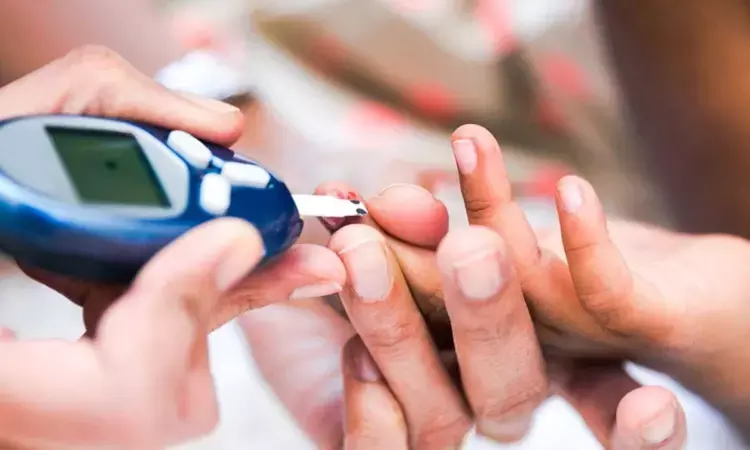- Home
- Medical news & Guidelines
- Anesthesiology
- Cardiology and CTVS
- Critical Care
- Dentistry
- Dermatology
- Diabetes and Endocrinology
- ENT
- Gastroenterology
- Medicine
- Nephrology
- Neurology
- Obstretics-Gynaecology
- Oncology
- Ophthalmology
- Orthopaedics
- Pediatrics-Neonatology
- Psychiatry
- Pulmonology
- Radiology
- Surgery
- Urology
- Laboratory Medicine
- Diet
- Nursing
- Paramedical
- Physiotherapy
- Health news
- Fact Check
- Bone Health Fact Check
- Brain Health Fact Check
- Cancer Related Fact Check
- Child Care Fact Check
- Dental and oral health fact check
- Diabetes and metabolic health fact check
- Diet and Nutrition Fact Check
- Eye and ENT Care Fact Check
- Fitness fact check
- Gut health fact check
- Heart health fact check
- Kidney health fact check
- Medical education fact check
- Men's health fact check
- Respiratory fact check
- Skin and hair care fact check
- Vaccine and Immunization fact check
- Women's health fact check
- AYUSH
- State News
- Andaman and Nicobar Islands
- Andhra Pradesh
- Arunachal Pradesh
- Assam
- Bihar
- Chandigarh
- Chattisgarh
- Dadra and Nagar Haveli
- Daman and Diu
- Delhi
- Goa
- Gujarat
- Haryana
- Himachal Pradesh
- Jammu & Kashmir
- Jharkhand
- Karnataka
- Kerala
- Ladakh
- Lakshadweep
- Madhya Pradesh
- Maharashtra
- Manipur
- Meghalaya
- Mizoram
- Nagaland
- Odisha
- Puducherry
- Punjab
- Rajasthan
- Sikkim
- Tamil Nadu
- Telangana
- Tripura
- Uttar Pradesh
- Uttrakhand
- West Bengal
- Medical Education
- Industry
COVID-19 infection increases risk of type 1 diabetes among young children with high genetic risk: JAMA

Germany: A longitudinal cohort study of 885 infants with an increased genetic risk of type 1 diabetes revealed a temporal association between SARS-CoV-2 infection and the development of islet autoantibodies. The findings were published online in the Journal of the American Medical Association (JAMA) on September 8, 2023.
"The incidence rate of islet autoantibodies developing concurrently with or soon after SARS-CoV-2 antibodies were detected was 7.8 per 100 person-years and in children without SARS-CoV-2 antibodies it was 3.5 per 100 person-years, a significant difference," the researchers reported.
Childhood type 1 diabetes is characteristically preceded by the development of antibodies against multiple pancreatic islet β-cell proteins. The researchers noted a peak period of susceptibility for developing these autoantibodies at about 1 year of age. Children who develop multiple islet autoantibodies usually advance to clinical type 1 diabetes within ten years.
Susceptibility for early islet autoimmunity is conferred by genes involved in islet β-cell function, immunity, and responses to viral infections. There is no clarity on the cause of islet autoimmunity, suspected contributors include early viral infections.
During the COVID-19 pandemic, there has been an increase in the incidence of childhood diabetes. Elucidating whether SARS-CoV-2 infection is linked with islet autoimmunity, which precedes type 1 diabetes onset, is relevant to future childhood diabetes trends and disease aetiology.
Marija Lugar, Center for Regenerative Therapies Dresden, Dresden, Germany, and colleagues aimed to determine whether there is a temporal relationship between SARS-CoV-2 infection and the development of islet autoimmunity in early childhood.
The Primary Oral Insulin Trial, a European multicenter study enrolled 1050 infants (aged 4 to 7 months) between 2018 to 2021 with a more than 10% genetically defined risk of type 1 diabetes.
SARS-CoV-2 infection was identified by the development of SARS-CoV-2 antibody in follow-up visits conducted at 2- to 6-month intervals until age 2 years from 2018 to 2022.
The study's main outcome was the development of multiple (≥2) islet autoantibodies in follow-up in consecutive samples or single islet antibodies and type 1 diabetes. The researchers analyzed antibody incidence and risk of developing islet autoantibodies.
The authors reported the following findings:
- Consent was obtained for 885 (441 girls) children who were included in follow-up antibody measurements from age 6 months.
- SARS-CoV-2 antibodies developed in 170 children at a median age of 18 months.
- Islet autoantibodies developed in 60 children. Six of these children tested positive for islet autoantibodies at the same time as they tested positive for SARS-CoV-2 antibodies and 6 at the visit after having tested positive for SARS-CoV-2 antibodies.
- The sex-, age-, and country-adjusted hazard ratio for developing islet autoantibodies when the children tested positive for SARS-CoV-2 antibodies was 3.5.
- The incidence rate of islet autoantibodies was 3.5 per 100 person-years in children without SARS-CoV-2 antibodies and 7.8 per 100 person-years in children with SARS-CoV-2 antibodies.
- Islet autoantibody risk in children with SARS-CoV-2 antibodies was associated with younger age (<18 months) of SARS-CoV-2 antibody development (HR, 5.3).
"SARS-CoV-2 infection was temporally associated with the development of islet autoantibodies in young children with high genetic risk of type 1 diabetes," the researchers concluded.
Reference:
Lugar M, Eugster A, Achenbach P, et al. SARS-CoV-2 Infection and Development of Islet Autoimmunity in Early Childhood. JAMA. Published online September 08, 2023. doi:10.1001/jama.2023.16348
Dr Kamal Kant Kohli-MBBS, DTCD- a chest specialist with more than 30 years of practice and a flair for writing clinical articles, Dr Kamal Kant Kohli joined Medical Dialogues as a Chief Editor of Medical News. Besides writing articles, as an editor, he proofreads and verifies all the medical content published on Medical Dialogues including those coming from journals, studies,medical conferences,guidelines etc. Email: drkohli@medicaldialogues.in. Contact no. 011-43720751


